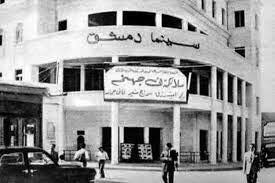In 1908, the first film ever screened in Syria was shown at a cafe in Aleppo. Eight years later, the Ottoman administration established the first film theater, in Damascus. The theater was inaugurated by the Ottoman governor, Jamal Pasha; however, it was burned down one month later. The French assumed mandate over Syria at that time, and many theaters were subsequently built in Damascus. The first Syrian film was Al Muttaham al Baree (The Innocent Suspect), a silent black-and-white feature released in 1928. The film was written, directed and produced by Rasheed Jalal, in association with Ahmed Tello. The crew set another precedent by forming the first Syrian production company: Hermon Film. In 1934, the second silent black-and-white film, Tahta Sama’ Dimashq (Under the Damascus Sky), was released, coinciding with the Egyptian musical talkie ( a term used to diferanciate between silent movies and spoken ones), Unshudat al Fuad (Hymn of the Heart). In 1943 the 1,500 seat Cinema Dimashq, one of the largest movie theaters ever constructed in the Eastern Mediterranean, opened in Damascus.
In 1947, Nazih Shabandar established a production studio filled with equipment he created. The following year, he produced the first Syrian talkie, Nur wa Thalam (Light and Darkness), written by Mohamed Shamel and Ali el-Arna’ut. The film was also significant because it featured several rising Syrian stars: Rafiq Shukri, Yevett Feghli, and Anwar el Baba.
Film production improved during the 1950s, but was still hindered by dreary distribution. The 1960s saw significant improvements with Doreid Lahham and Nuhad al-Qala’i, a comedic duo, generating higher profit margins than their predecessors. Their first film was Aqd al-Lulu (Necklace of Pearls), released in 1965. Aqd al-Lulu was the first in a tightly linked series of comedy films from the duo. Thanks to sufficient profits, they were able to produce films at a rate of two per year.
 The 1960s also marked a period of transition for Syrian film-making. In 1963, the General Organization for Cinema was established as a branch of the Ministry of Culture to oversee the production and distribution of Syrian films. The government at the time granted the General Organization for Cinema monopoly over the production and distribution of films. Consequently, the private film industry all phased out by the end of the 1960s. Films produced in that period focused on promoting Syrian advances in agriculture, health, and transportation. Documentary films were produced in large numbers to promote the construction of infrastructure; the impact of agricultural reform; and the provision of public services. In other words, the Syrian cinema shifted from entertainment to documenting.
The 1960s also marked a period of transition for Syrian film-making. In 1963, the General Organization for Cinema was established as a branch of the Ministry of Culture to oversee the production and distribution of Syrian films. The government at the time granted the General Organization for Cinema monopoly over the production and distribution of films. Consequently, the private film industry all phased out by the end of the 1960s. Films produced in that period focused on promoting Syrian advances in agriculture, health, and transportation. Documentary films were produced in large numbers to promote the construction of infrastructure; the impact of agricultural reform; and the provision of public services. In other words, the Syrian cinema shifted from entertainment to documenting.
Iraqi film maker Qays al-Zubeydi produced multiple films documenting the struggles of Palestinian refugees. Films like Bai’dan ‘an al-Watan (Far from their Country) and Shahadat al-Filastinyyin fi Zaman al-Harb (Testimonies of Palestinians in the Time of War), released in 1970 and 1972 respectively, circulated around the Arab world to influence the masses. The first fictional movie produced by the General Organization for Cinema was Sa’eq al-Shahinah (The Truck Driver), directed by Yugoslavian film maker Poçko Fockovic and released in 1967.
Some directors associate their experience in the National Film Organization with what can be called the “artistic identity of Syrian cinema,” a period that stretched between the 1970s and 1980s. This identity presented a different visual form, and is represented by a generation of directors who studied cinema abroad and returned to Syria to make their films, which were produced by the National Film Organization. They include Nabil al-Maleh, Mohamed Malas, Samir Zekry, Raymond Boutros, Maher Kido, Riyad Chia and Abdullatif Abdel-Hamid.
This was in addition to the important experiences of Arab filmmakers to whom the organization granted the opportunity to produce their films, such as Al-Makhdu’un (“The Deceived”) by Tawfiq Saleh in 1973, Al-Yazerli by Qais al-Zubaidi in 1974 and Kafr Qasim by Burhan Alawiya, also in 1974.
 The film “Night” released in 1992, is a Syrian classic directed by the most famous living Syrian director, Mohammad Malas. Shot in his hometown, Quneitra, this is an art house autobiographical tale about three generations, from the Syrian fight for independence, to the war with Israel.
The film “Night” released in 1992, is a Syrian classic directed by the most famous living Syrian director, Mohammad Malas. Shot in his hometown, Quneitra, this is an art house autobiographical tale about three generations, from the Syrian fight for independence, to the war with Israel.
Syrian cinema has existed since the early 20th century. In the 60s, the film sector has been mainly managed by the National Organization for Cinema, a department of Ministry of Culture. The film industry blossomed in the 1960s, with a significant shift toward nationalistic documentaries, and has continued to gain attention.
Report: lama Alhassanieh



